Cheryl Glickman, the narrator of Miranda July’s strenuously quirky first novel, is a peculiar woman of peculiar habits who works at a business with peculiar customs. So it comes as little surprise when she finds herself saddled with a house guest who is also rather odd. Eccentricities, as uncountable as the sands of the Sahara, drift and blow through this book, piling up in dunes that must be scaled by characters and readers alike.
A plain, gawky woman in her early 40s, Cheryl works at a nonprofit women’s self-defence studio that survives by selling DVDs of martial-arts-influenced fitness routines. She pines for Phillip, a board member more than 20 years her senior, who, she is convinced, has been her companion in several past lives, during prehistory, the “medieval times” and the 1940s. She also believes she is destined to be united with a boy she calls Kubelko Bondy, whose spirit briefly appears in various infants she has encountered over the decades – all of them, sadly, belonging to other women.
Cheryl practises a forlorn, austere domestic economy that involves using as few items as possible: “Before you move an object far from where it lives, remember you’re eventually going to have to carry it back to its place – is it really worth it? Can’t you read the book standing right next to the shelf with your finger holding the spot you’ll put it back into? Or better yet: don’t even read it.” She thinks of herself as having a full-time servant, “because the servant is me”.
This is familiar territory for July, who wrote and directed the independent feature film Me and You and Everyone We Know along with numerous shorts, all populated by similar misfits. Here, once more, are the freakish preoccupations (Cheryl is afflicted by “globus”, a knot of muscles in her throat, and tunelessly murmurs a David Bowie song to fend off obsessive thoughts about phrases such as “birds of a feather flock together”) and the New Agey miasma in which her southern California characters strive to soothe their souls. Phillip refers the globus-plagued Cheryl to a “chromotherapist”, who prescribes a tiny bottle of clear liquid that allegedly contains the essence of red. Nearly everyone in the novel justifies their capricious narcissism with the lingo of self-actualisation, all while treating the lonely Cheryl as either a convenience or an encumbrance.
That includes her bosses, a psychobabbling married couple who dump their buxom, surly 19-year-old daughter on her. The girl, Clee, establishes a base camp on Cheryl’s couch, wreaking havoc on her life. Clee is indolent and unwashed, with reeking feet and a fathomless appetite for television. She is also, as Cheryl will quickly discover, violent. Meanwhile, after getting Cheryl’s hopes up, Phillip predictably reveals that his romantic interest lies elsewhere.
Cheryl’s life and relationships take multiple unexpected turns in the course of The First Bad Man, although there is never much doubt that she’ll eventually get what she needs, if not what she thinks she wants. That is the skeleton of the plot, which is sentimental. There is a pleasingly shrewd, aphoristic element to Cheryl’s observations that seems to jar with the novel’s paean to love and longing at their most awkward. “Everything she said made perfect sense but only for a few minutes, then it expired,” she thinks of her therapist. “She was exactly the type of woman who ends up murdered,” she thinks of Clee. At moments like these, you can feel July – a veteran of several alternative arts scenes and a media figure – poking through the facade of Cheryl’s naivete.
July’s previous book, No One Belongs Here More Than You, was a story collection, and the short form, with its brief glimpse into a character’s life, is better suited to her aesthetic. It’s true that if you dig deeply enough, you can find something bizarre about almost anyone. When, however, the focus for nearly 300 pages is on a relatively small cast, the multiplying weirdness becomes unamusing absurdity. That Cheryl’s therapist pretends to be another therapist’s receptionist for three days every year as part of an “adult game” is sufficient. That she has her clients urinate behind a Japanese screen in her office because the restrooms are too time-consuming to reach mid-session is superfluous. So is the box of mail-order snails that turns up in Cheryl’s house later in the story, causing the characters to pluck escapees from the fixtures and bookshelves for pages to come. It is not that such things could never happen; rather, too many of them happen to not enough people, and eventually you just become tired of them.
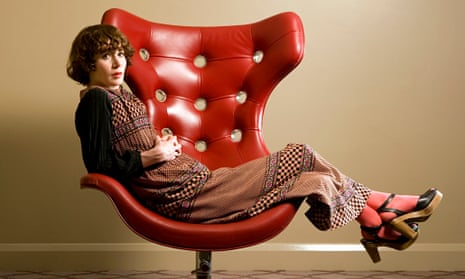




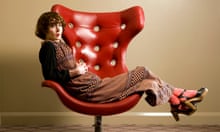
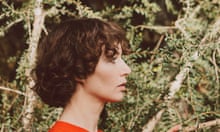
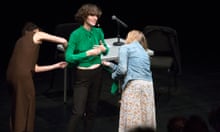
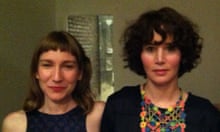
Comments (…)
Sign in or create your Guardian account to join the discussion